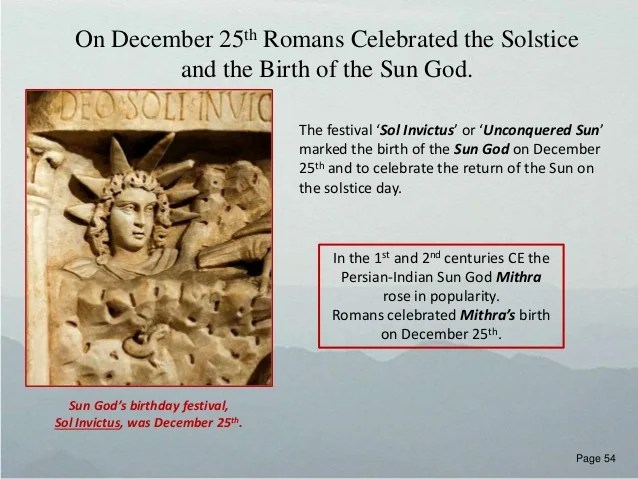Interesting to see so many people fighting to say that there is no paganism in Christmas. Why?
I've lived in Mexico for over 12 years now, and we are witnessing the Nordic paganization of Christmas. Yesterday was the posada (inn) on my street, in which children reenact Joseph and Mary looking for a place to have the baby. One home is chosen as the manger, and the kids knock on several doors first only to be told to go away. Eventually, they get to the chosen home, they are told yes, and a celebration is had on the street. That's the desert holiday that represents the Christian story of the birth of Jesus:
But during those years, the Nordic pagan influence has seeped in, mostly due to a Wal-Mart opening and selling Christmas trees and Christmas lights. Santa, Frosty, and Rudolph are still rarely seen in my village. You can see a bit more here if interested:
Christmas came to Chapala | (semanariolaguna.com) It's beginning to look more like the American Christmas.
Their Easter is still a Christian holiday, with passion plays and reenactments of the crucifixion. Still none of the American pagan infusion of bunnies and eggs.
And here's a nice little story about the Sun dying and revivifying on the third day. I'm sure that this is all just a coincidence, and not a pagan influence on Christmas. From
DECEMBER 22 – 25: THE DEATH AND BIRTH OF THE UNCONQUERED SUN | notclif:
The ancients selected December 21, the Winter Solstice as the ideal time to invoke the sun. Maybe if you were living in the north pole and had long, dark harsh winters to deal with you might want to invoke the sun too.
In the solar myth, the death of the “old sun” occurs as the length of daylight decreases and becomes its lowest at the Winter Solstice which begins on the midnight of December 21 (early morning December 22) and ends on Midnight December 24 (early morning December 25). The sun stop moving south on December 22, it is then at its lowest point in the Northern Hemisphere, residing in the vicinity of the Southern Cross. It stays at this lowest point for three days (December 22, 23, 24 appearing to not moving south or north and was considered “dead”
It “returned to life” at midnight on December 24/ early morning December 25, when it begins its northern journey again and the hours of sunlight start to lengthen. Therefore, the ancient said that the SUN was born on December 25. As a result, mistletoes, holly, wreaths, cakes, gifts, greeting cards and feasts were done to honour Sol or Mithra or Saturnalia as the case may be. Interestingly, on December 24, Sirius (star in the east and brightest star in the night sky) aligns with the three brightest Orion belt stars called the Three Kings, (Alnitak, Alnilam and Mintaka) and on December 25, these all point to the location where the sun will rise on earth that day. In essence, the three kings follow the star in the east to find the sunrise (birth of the sun).
DECEMBER 25: BIRTHDAY OF THE SUN OR SON?
As a Baptist, I grew up with the belief that December 25 is the birthdate of Jesus Christ and as such we worship and acknowledge it as Christmas. Indeed, Christmas is big— very big. The entire Island of Jamaica comes to a virtual standstill. Schools and colleges are closed; businesses shut down to give their employees time off; many families plan trips and get-togethers; Church attendance increase; and gifts are given by even those who were scrooge all year long. Maybe you recall, the Christmas Carol that even erroneously say “ Long time ago in Bethlehem, so the Holy Bible said, Mary’s boy child Jesus Christ, was born on Christmas Day” However, recall all these activities were already being done in Rome, Babylon, Persia, Greece, and Egypt to acknowledge and worship the birth day of Sol Invicta (the Unconquered Sun) up to 4000 years before Jesus Christ was born. It then begs the question, whose birthday are we celebrating on December 25? Does Jesus the SON share the birthday with the SUN?


